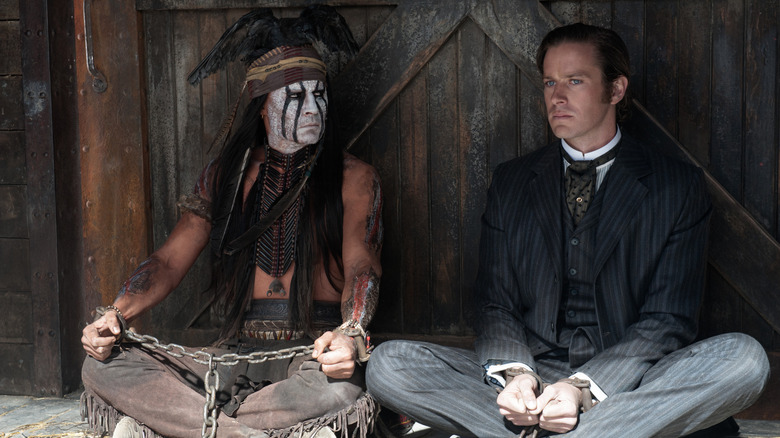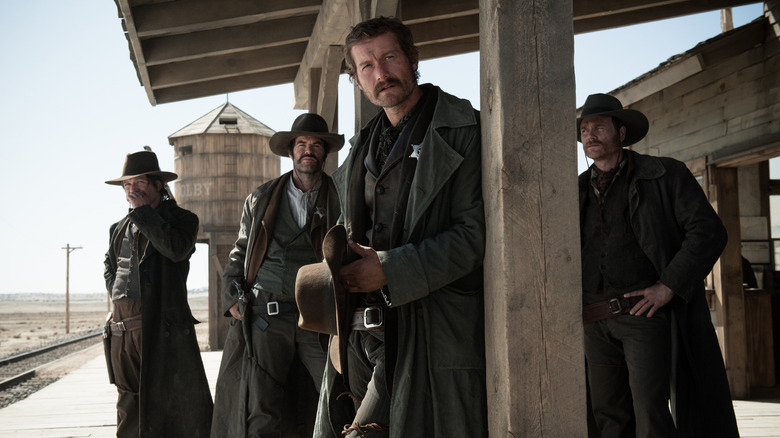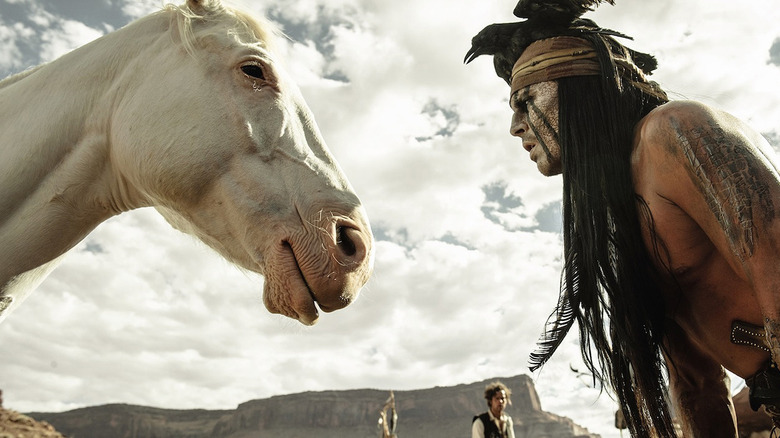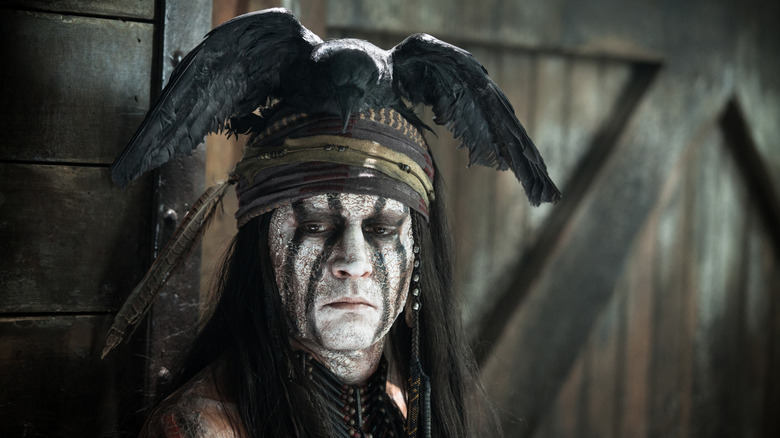How Johnny Depp's The Lone Ranger Became One Of Disney's Biggest Box Office Flops
Disney, as a studio that has been around for a full century, is known broadly as one of the most successful entertainment companies in history. The number of classic films the House of Mouse has produced is staggering, and the hits far outweigh the misses. Although Disney has missed and missed big on a few occasions, with 2013's "The Lone Ranger" ranking as one of the biggest of those big misses. So much so that one could argue that it's among the biggest box office bombs in history — not just limited to Disney. At the height of Johnny Depp's superstardom, this was a grand misfire for the ages.
Depp had been a big star since breaking out in the '90s. However, following the success of his turn as Captain Jack Sparrow in 2003's "Pirates of the Caribbean: The Curse of the Black Pearl" (which came with an unexpected Oscar nomination for the actor), it hit another level. Depp became a superstar on a level that few actors have ever known, and Disney tried to capitalize on that by putting him in another big-budget adaptation of a beloved property with the hopes of starting a major franchise. What's more, director Gore Verbinski, who made "Pirates" what it was, would be behind the camera, with Depp starring opposite Armie Hammer, who was then on the verge of A-list breakout status. What could go wrong?
The answer, it turns out, is just about everything, as "The Lone Ranger" became a critical and commercial flop beyond reason. Its budget ballooned, critics largely hated it, and Disney lost a ton of money in the process that it probably hasn't ever managed to recover. So, what exactly went wrong? How did Disney let this happen? Let's get into it.
Big-budget Westerns just don't work
"The Lone Ranger" was an attempt by Disney to make a mega-blockbuster Western, based on the once-popular character of the same name who started life on the radio before making the jump to TV in the late '40s. Yet, as the studio would learn, big-budget Westerns tend not to work very well, as other studios previously learned with projects like "Jonah Hex" ($10 million box office/$47 million budget) and "Cowboys & Aliens" ($174 million box office/$163 million budget). Unfortunately, this movie was getting into "most expensive movies ever made" territory.
Gore Verbinski's film was actually barreling towards production with a budget said to be in the $250 million range, which was an eye-melting figure. So much so that Disney actually pulled the plug just weeks ahead of production to attempt and get the budget under control. Verbinski tried to remove certain sequences, and several key members of the production even offered to trim their fees to keep the film moving forward. Ultimately, it did move forward, but the final budget was still said to be at least $215 million (though some put it higher).
What's important is that there were signs things were not headed in a great direction before cameras even started rolling. Many questioned why a Western should cost so much in the first place, and it's a reasonable question. But Verbinski had a pricey vision and, given his past success, Disney ultimately decided to press forward. Had Disney pulled the plug, they might have saved a lot of money.
Critics largely hated it
One thing that generally must happen when making a movie that expensive is that it must be good. That feels like an incredibly obvious thing to say, but movies largely perceived as bad do make money a lot of the time. Just look at the "Transformers" franchise (save for "Bumblebee") and the "Venom" films. Yet, Gore Verbinski's magic didn't rub off on the troubled "Lone Ranger," as critics roundly rejected the over-budgeted revamp of the pulp hero. It currently holds a brutal 31% critical approval rating on Rotten Tomatoes, to go with an equally poor 51% audience rating.
It's exceedingly difficult to overcome that lack of must-see buzz when the movie costs twice what most huge blockbusters cost (before marketing). Not to mention that the film was already generating negative headlines well ahead of its release since Johnny Depp was playing the role of Tonto, a Native American. The potentially questionable nature of this casting choice was debated hotly. Speaking in advance of the release, Depp did try to explain why he wanted to take on the role:
"The whole reason I wanted to play Tonto is to try to [mess] around with the stereotype of the American Indian that has been laid out through history, or the history of cinema at the very least — especially Tonto as the sidekick, The Lone Ranger's assistant. As you'll see, it's most definitely not that."
Regardless, it wasn't a great look and once the reviews hit, things went from bad to worse. The narrative that was built ahead of opening weekend was not one that pointed to great success. Everything was pointing towards disaster, which is exactly what came to pass.
IP for the sake of IP almost never works
After suffering several delays, "The Lone Ranger" finally hit theaters on the Fourth of July weekend in 2013. Coming in well below tracking, the movie took in just $29.2 million domestically, losing badly to "Despicable Me 2." To make matters much, much worse, the competition got fierce in the weeks that followed, as movies like "Pacific Rim," "Grown Ups 2," "The Conjuring," "Red 2," and "The Wolverine," among many others, entered the fold.
The movie finished its run with just $89.3 million domestic in total. Overseas, it brought it $171.2 million for a ruinous $260.5 million finish. Given that theaters generally keep around half of the box office, that means Disney was in the red in a big, bad way. While the precise figure remains elusive, it's estimated that the film might've lost as much as $190 million. Then-studio president Alan Bergman said the following on an earnings call in 2017, responding to a question about whether or not the movie ever ended up making its money back:
"I'm going to answer that question honestly and tell you no, it didn't get that much better. We did lose that much money on those movies. As I said, it is hard to make movies, and those particular two just did not come together."
Bergman was also talking about "John Carter," which had flopped spectacularly the year before "Lone Ranger" came out. "It's disappointing. The frustrating thing for us is that it felt like the ingredients were there," said Dave Hollis, Disney's executive VP of theatrical exhibition sales and distribution at the time, speaking with Entertainment Weekly.
Yes, sure, it felt like the ingredients were there, but as studios have had to learn time and time again: IP for the sake of IP means nothing. A good movie, meanwhile, means quite a lot. That's why "Pirates of the Caribbean" succeeded, above all else, and it's why "The Lone Ranger" failed.



